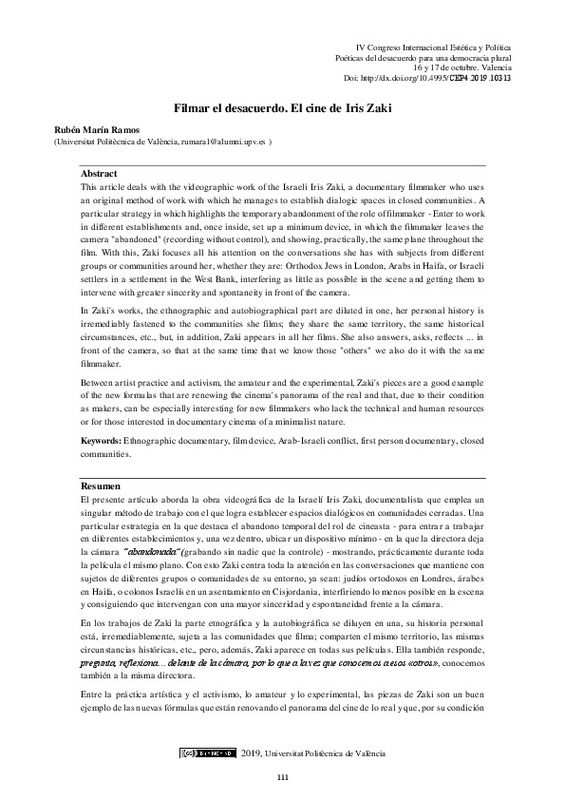|
Resumen:
|
[ES] El presente artículo aborda la obra videográfica de la Israelí Iris Zaki, la cual emplea un singular método de trabajo con el que logra establecer espacios dialógicos en comunidades cerradas. Una particular estrategia ...[+]
[ES] El presente artículo aborda la obra videográfica de la Israelí Iris Zaki, la cual emplea un singular método de trabajo con el que logra establecer espacios dialógicos en comunidades cerradas. Una particular estrategia en la que destaca el abandono temporal del rol de cineasta para entrar a trabajar en diferentes establecimientos y, una vez dentro, el empleo de un dispositivo mínimo - en la que la directora deja la cámara grabando sola (sin nadie que la controle) - mostrando, prácticamente durante toda la película, el mismo plano. Con esto Zaki centra toda la atención en las conversaciones que mantiene con sujetos de diferentes grupos o comunidades de su entorno, ya sean: judíos ortodoxos en Londres, árabes en Haifa, o colonos Israelís en un asentamiento en Cisjordania, interfiriendo lo menos posible en la escena y consiguiendo que intervengan con una mayor sinceridad y espontaneidad frente a la cámara. En los trabajos de Zaki la parte etnográfica y la autobiográfica se diluyen en una, su historia personal está, irremediablemente, sujeta a las comunidades que filma; comparten el mismo territorio, las mismas circunstancias históricas, etc., pero, además, Zaki aparece en todas sus películas. Ella también responde, pregunta, reflexiona… delante de la cámara, por lo que a la vez que conocemos a esos «otros» lo hacemos también con la misma directora. Entre la práctica artista y el activismo, lo amateur y lo experimental, las piezas de Zaki son un buen ejemplo de las nuevas fórmulas que están renovando el panorama del cine de lo real y que por su condición hacedora, pueden ser especialmente interesantes para nuevos creadores que carezcan de los recursos técnicos ligados a la tradición cinematográfica o para aquellos atraídos por el documental de vanguardia.
[-]
[EN] This article deals with the videographic work of the Israeli Iris Zaki, a documentary filmmaker who uses
an original method of work with which he manages to establish dialogic spaces in closed communities. A
particular ...[+]
[EN] This article deals with the videographic work of the Israeli Iris Zaki, a documentary filmmaker who uses
an original method of work with which he manages to establish dialogic spaces in closed communities. A
particular strategy in which highlights the temporary abandonment of the role of filmmaker - Enter to work
in different establishments and, once inside, set up a minimum device, in which the filmmaker leaves the
camera "abandoned" (recording without control), and showing, practically, the same plane throughout the
film. With this, Zaki focuses all his attention on the conversations she has with subjects from different
groups or communities around her, whether they are: Orthodox Jews in London, Arabs in Haifa, or Israeli
settlers in a settlement in the West Bank, interfering as little as possible in the scene and getting them to
intervene with greater sincerity and spontaneity in front of the camera.
In Zaki's works, the ethnographic and autobiographical part are diluted in one, her personal history is
irremediably fastened to the communities she films; they share the same territory, the same historical
circumstances, etc., but, in addition, Zaki appears in all her films. She also answers, asks, reflects ... in
front of the camera, so that at the same time that we know those "others" we also do it with the same
filmmaker.
Between artist practice and activism, the amateur and the experimental, Zaki's pieces are a good example
of the new formulas that are renewing the cinema's panorama of the real and that, due to their condition
as makers, can be especially interesting for new filmmakers who lack the technical and human resources
or for those interested in documentary cinema of a minimalist nature.
[-]
|









